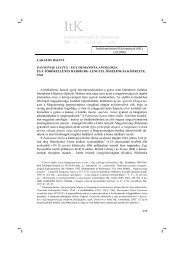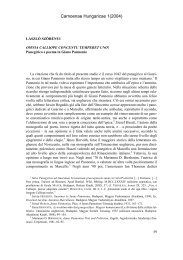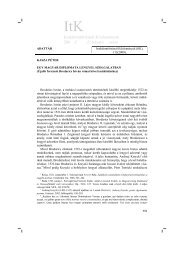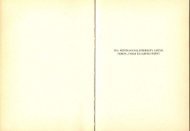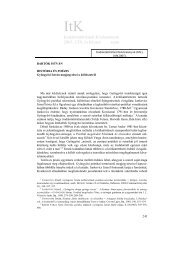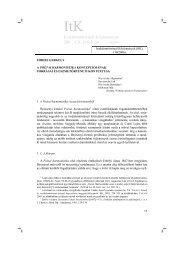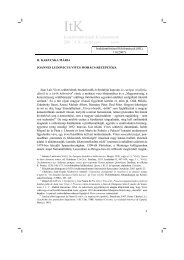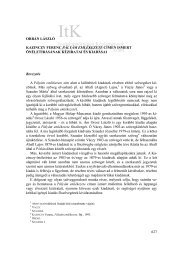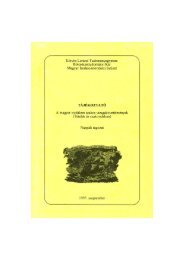Camoenae Hungaricae 3(2006) - Irodalomtörténeti Közlemények
Camoenae Hungaricae 3(2006) - Irodalomtörténeti Közlemények
Camoenae Hungaricae 3(2006) - Irodalomtörténeti Közlemények
Create successful ePaper yourself
Turn your PDF publications into a flip-book with our unique Google optimized e-Paper software.
<strong>Camoenae</strong> <strong>Hungaricae</strong> 3(<strong>2006</strong>)<br />
Perhaps he was one in the literal sense—as a member of the English delegation travelling<br />
to Constantinople, he is sure to have spied on the English and further research would<br />
have an easy time revealing that he also collected information on the members of opposing<br />
courtly factions primarily on the commission of Chancellor Kinsky. 22 But he was a<br />
spy in a much deeper sense as well, a spy in the essence of his personality and vocation.<br />
His greatest passion was gathering intelligence, he was interested in everything (the mysteries<br />
of mathematics and astronomy, the state of the opposing armies’ equipment, the<br />
waters of the Bosporus, the fish in the rivers Danube and Theiss, the intentions of the<br />
diplomats involved in the peace negotiations, the history and geology of territories conquered<br />
or to-be-conquered, the customs and languages of faraway peoples). The word he<br />
used most often and not without a touch of religious piety was Informazione. At the same<br />
time, he exhibited manic preoccupation with organising, holding back and circulating of<br />
information, with the separation of informational circles and networks—in other words,<br />
with the issue of boundaries in general. Psychologically speaking, it was a masterstroke<br />
by the Viennese government to put him in charge of the border survey project. In the<br />
light of all this, I think the secrets of the documents he left behind can only be unlocked<br />
by a special kind of espionage: research into the Marsili papers is a task of philological<br />
archaeology. The various projects, the finished or incomplete texts often embedded into<br />
other works constitute layers that are often difficult to distinguish from one another and<br />
in many cases, the contributions of the count’s various colleagues (cartographers, political<br />
advisers, science experts) are difficult to tell from his own work. Therefore I am basing<br />
my hypothesis concerning the original order of the material on an inter-textual analysis,<br />
in the course of which I examined the texts of a colleague who seemed to have more<br />
influence than any other in ordering the layers of the legacy. The presentation of the<br />
collaboration between the imperial ideologue Marsili and the nation builder Pavao Vitezović<br />
Ritter, the father of pan-Croatian and Illyrian ideology, is outside the scope of this<br />
paper 23 and so is the analysis of their similarities and differences—but a demonstration of<br />
the philological links must be carried out. I will conclude this paper by putting forth my<br />
own proposition with regards to a new Marsili edition and the coordination of the research<br />
necessary for this, relying on the former plans to publish Marsili’s Acta executionis<br />
pacis and the notions since articulated in the relevant literature.<br />
22 On his espionage activities as a member of the English delegation to Constantinople and the scandal that<br />
broke out after his detection, see STOYE 1994, op. cit., 101–118.<br />
23 A lecture of mine on the issue (Real Heroes with Hindsight: Marsigli’s Mission in the Recaptured Territories<br />
in South-Hungary) delivered at the Whose Love of Which Country? Towards an Intellectual History<br />
of Patriotic Discourses in the Early-Modern Period conference (Central European University, Budapest, 20–<br />
21 May <strong>2006</strong>) is under publication in the conference papers (ed. Balázs TRENCSÉNYI).<br />
117



